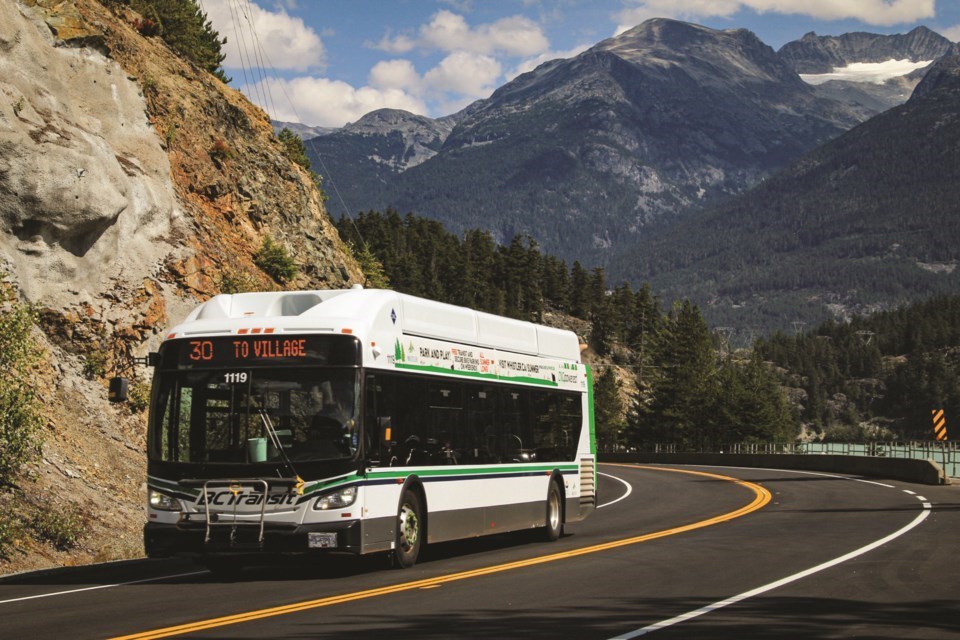The Resort Municipality of Whistler (RMOW) has greenlit a renewed agreement with BC Transit that includes 6,000 additional service hours and a 13-per-cent jump in operating costs—but also kicks off a debate about whether the municipality should continue offering free weekend and holiday bus service.
The local government’s share of operating costs for 2025-26 totals $5.5 million, with the new deal requiring an additional $452,276 in funding compared to the previous agreement.
Council approved the new annual operating agreement on July 22 and directed staff to prepare a budget amendment and review the future of its free weekend transit program.
More service for Route 21, staff housing and peak hours
The 6,000 added transit hours began in April 2025 and were focused primarily on improving frequency in Spring Creek.
“The 6,000 hours really was focused mostly on Route 21 ... making that half-hourly service during spring, summer and fall—where it used to be, you could only get a bus once an hour,” said transportation demand management coordinator Emma DalSanto.
Other refinements include:
- Two new early-morning Route 7 trips for staff housing between 6:45 and 7:30 a.m.;
- Extra time for Route 10 during peak periods;
- A reallocation of one poorly used late Route 21 trip to a night run from the Village to Cheakamus Crossing.
Council’s request for 15-minute frequency on Route 10 was denied due to the need for more buses.
“BC Transit calculated that ... we would need an additional four vehicles,” said DalSanto. “A vehicle only has a certain number of kilometres it can do per year ... you have to have a couple in reserve just in case.”
Council may revisit the request in the 2026-27 agreement.
Umo app in full swing, credit cards to come
Earlier this year, BC Transit implemented the Umo app, which replaced the existing Transit app powered by Transit Royale.
Anyone wishing to continue using Transit Royale will now need to pay for it.
Credit card payments will be available by the end of the year.
Cost pressures mount
The renewed agreement reflects rising expenses across the system, including:
The 6,000-hour service expansion; a five-per-cent fee increase for leasing buses; higher fuel and maintenance costs; credit card processing and Umo service charges; and changes to operator contracts.
Staff estimate the 2025 fare increase—approved on June 24—will bring in $50,000 by year-end. That leaves $230,000 to be funded through Whistler’s Operating Reserve and included in the Five-Year Financial Plan.
The COVID-era Safe Restart fund, otherwise known as the Local Transit Fund (LTF), which helped cover operating costs, will be depleted by 2026.
“This year, the 6,000 hours went mostly to offset some of the optimization that we had done in 2023,” said DalSanto. “We’ve put some more service back into the Route 20s that are south of town and the Route 30s that are north of town.”
Free weekend transit on the chopping block
The RMOW is also considering cutting free weekend and holiday transit, a service introduced in 2016 to reduce congestion. The program costs an estimated $150,000 to $200,000 annually.
CAO Ginny Cullen said the suggestion to review the program came down to budget constraints.
“I put it in there because of the increasing costs and the need to continue to look at trade-offs in our budget,” she said.
Dale Mikkelson, the RMOW’s GM of climate action, planning and development services, said several factors prompted the review.
“We noticed ... the number of monthly pass ridership is going up substantially,” he said. “With the ProPass and employers like Whistler Blackcomb supporting bus pass programs ... that free weekend service may not actually be best servicing our community as it has in the past.”
He added that Umo’s tap-payment system could shift visitor behaviour and make it easier to pay compared to the days of cash ridership.
Councillor Cathy Jewett said residents with monthly passes feel shortchanged by the free service.
“One of the comments that I’ve heard from locals for years is ... why are they buying a pass when weekends and holidays are free?” she said. “There was a lot of resentment from pass holders.”
Coun. Jessie Morden questioned whether the program meaningfully reduces congestion.
“It probably hasn’t affected [traffic], because you can see heavy traffic and a lot of parking congestion on the weekend still,” she said.
Morden also asked staff to consider charging a small fare for the Village Shuttle, which is currently free.
"If we’re looking at this huge cost to transit ... could we look at what that would be to start implementing a small fare?” she said.
Mikkelson said staff could incorporate her suggestion into the free service review. However, Jewett noted the Village Shuttle is fully funded by RMI, which is tied to tourist-serving infrastructure.
“Unless we rearrange RMI somewhere else ... I don’t really see how we could move to a pay system in the Village,” Jewett said.
Coun. Jeff Murl cautioned against changes before fully understanding the loss of COVID restart funding.
“There is kind of a big moment where the budget is going to readjust,” he said. “Losing a huge component of funding ... will have an impact.”
Coun. Ralph Forsyth said the municipality should double down on transit as a climate strategy, not retreat.
“We spend an enormous amount of our budget on things that don’t do any good for the environment or are limited in their scope,” he said. “Free transit ... is the No. 1 arrow in our quiver.”




